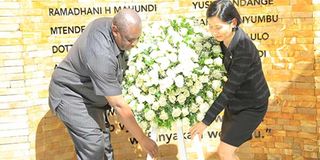Tanzania and Kenya remember Al-Qaeda bomb attacks of 1998

Home Affairs Minister Kangi Lugola and Chargé d'Affaires of the U.S. Embassy in Dar es Salaam Dr. Inmi Patterson lay a wreath in commemorating the 20th anniversary of devastating US embassy bombings in Dar Es Salaam on August 6, 2018. Photo | Anthony Siame
What you need to know:
The diplomatic mission was devastated by a huge explosion on the morning of August 7, 1998, followed minutes later by another massive blast which wrecked the US embassy in Tanzania.
Kenya and Tanzania on Tuesday marked the 20th anniversary of devastating US embassy bombings in Nairobi and Dar Es Salaam, which signalled Al-Qaeda's emergence as a deadly player on the global stage.
In Nairobi, families of the victims and officials gathered for a moving ceremony at a memorial park in the centre of the Kenyan capital, built on the site of the US embassy.
The diplomatic mission was devastated by a huge explosion on the morning of August 7, 1998, followed minutes later by another massive blast which wrecked the US embassy in Tanzania.
A total of 224 people were killed in the attacks and around 5,000 injured -- mostly Africans.
With two monster bombs loaded onto the back of trucks and a trail of carnage in east Africa, the world was introduced to Osama bin Laden three years before the September 11 attacks in New York would make him a household name.
"Twenty years ago today, evil showed its terrible face in Kenya and Tanzania," US Ambassador to Kenya Robert Godec told the gathering.
"In the middle of a busy Friday morning, Al-Qaeda terrorists exploded bombs outside the US embassies here in Nairobi and in Dar es Salaam."
"In an awful moment, the lives of thousands changed forever as did the lives of their families and friends," he said.
The Nairobi Chamber Chorus performed the US and Kenyan national anthems then the crowd, lit candles in hand, listened as the names of the victims were read out to the sound of a solo violin.
One of those laying flowers at the memorial site was Teddy Gianopulos, an elderly woman whose sister had been working at the embassy when the bomb went off.
"She’s very much alive in our mind. This day is a very painful day for her family, her children and her grandchildren, whom she didn’t get to see, of course," she told AFP.
"It is very painful, it still chokes me (up) a lot to think about it."
A similar memorial service was also due in Dar Es Salaam.
- Two decades of violence -
"On that day.. Al-Qaeda's appetite and ambition for large-scale attacks grew," said Martin Kimani, head of Kenya's National Counter Terrorism Centre.
"Since then, large parts of the world have endured repeated attacks by terrorists."
Three years after the carnage in East Africa, Bin Laden went on to stage the 9/11 attacks in which nearly 3,000 people died when hijacked passenger aircraft hit the Pentagon in Washington and destroyed the Twin Towers at the World Trade Center, the symbol of New York's financial wealth.
Kenya itself has also been hit by further mass bloodshed. Two years after the embassy attack, it sent troops across the border into Somalia to fight the Al-Qaeda-linked Al-Shabaab, which had been staging attacks on its soil.
The group hit back violently, staging a major attack on Nairobi's Westgate shopping centre in 2013, killing 67 people, and another assault on Garissa University in eastern Kenya two years later, which left 148 dead.
- 'Suffering but not beaten' -
"Tragically, since the bombings, Al Qaida and other terrorist groups have continued their savage assault on humanity," the US ambassador told the crowd.
"From New York to Paris to Bali to Garissa, to the mall of Westgate, the terrorists have followed their murderous agenda.
"But today ... we say clearly and loudly that although we have suffered, we are not beaten," he said.
"We will never let those who traffic in death and destruction defeat us."
Kenya has not seen a major attack since 2015, with counter-terror chief Kimani saying the country was benefitting from ongoing cooperation with its allies although he admitted that the ever-present threat required "continued vigilance".
In 2011, the White House said Bin Laden had been killed in Pakistan by US special forces and since then, attention has swung away from Al-Qaeda to the rival Islamic State (IS) group which was formed in 2013 and has staged a string of deadly mass attacks.
Experts warn, however, that Al-Qaeda has been quietly rebuilding.





